
|
HOLIDAYS AND HOLY DAYS
tebs
SHAVUOTH (Weeks)
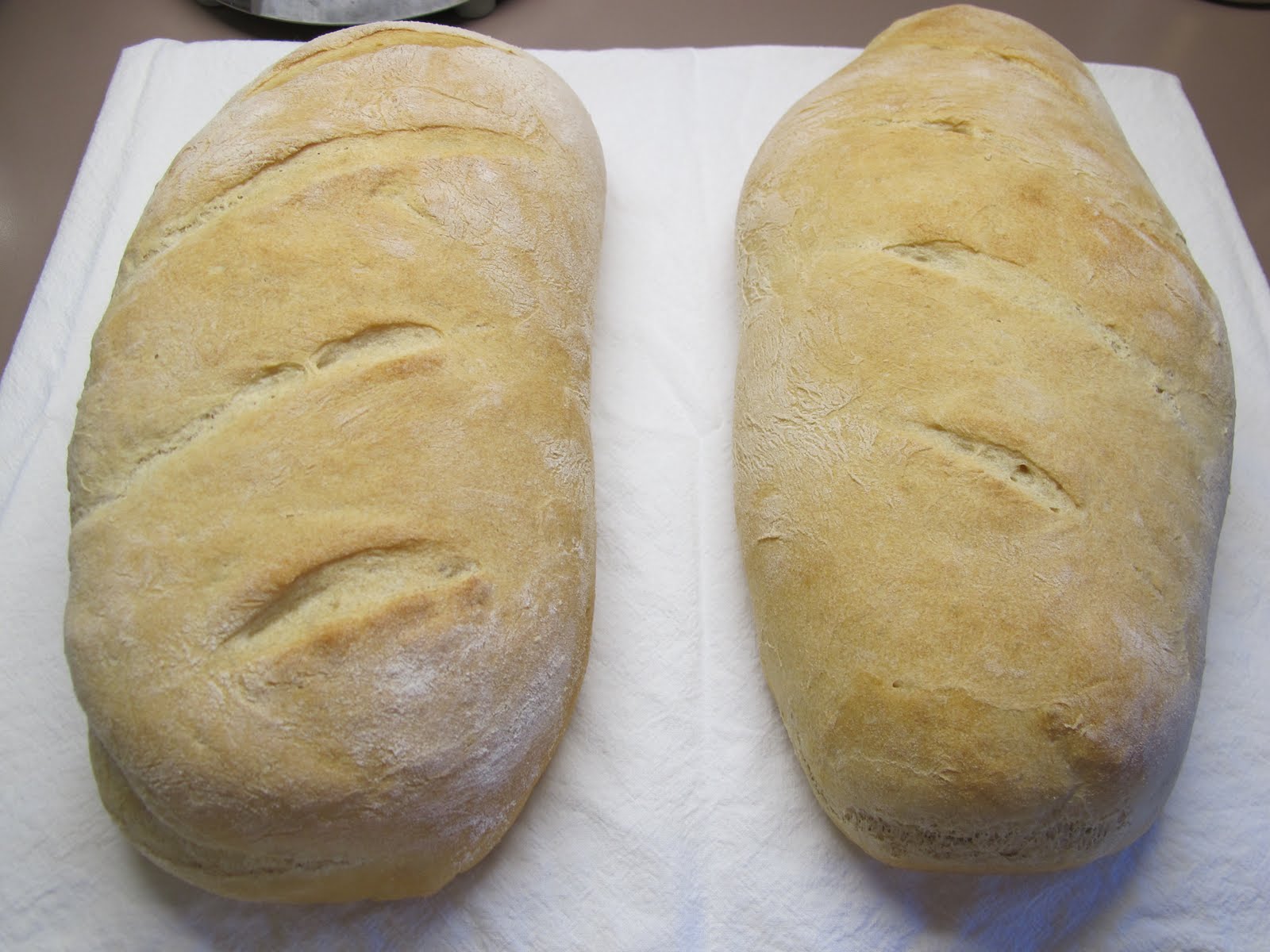
Note: you will need the oldheb.ttf (old Hebrew) and the SGreek Mediuim fonts to see the Hebrew and Greek text, as well as the three English fonts: Cooper Black, Impact and Frontlight MT Light. Right click the links and choose "Save Target As". Then go to the file, and either right click them and choose "install", or drag them into the font page.
oldheb.ttf
SGreek Medium
Cooper Black
Impact
Frontlight MT Light
NOTE: All of the yous and yours underlined as "you" and "your" indicates that the you and the your are plural. Also any of the words that are in bold pink lettering as "you" refers to the feminine gender, but it is only applied when it does not commonly refer to a woman. This only is applied to this week's Torah portion text at this time.
KHAG SHAVUOTH SAMEAKH EVERYONE!!!
This is the Torah regarding Shavuoth, which is noted in the book of Leviticus
Leviticus 23:15-22
Lev 23:15 And from the morrow of the Shabbath, from the day you shall bring near ta-the omer-sheaf of the Wave Offering; you shall enumerate (scroll) for yourselves seven Shabbaths, they shall be accomplished (complete, perfect): 16 unto from the morrow of the seventh Shabbath, you shall enumerate (scroll) fifty days; and you shall bring near the Renewed Donation Offering (Tribute Offering, Food Offering, Grain Offering) to hwhy. 17 From your dwellings you shall bring two Breads of the Wave Offering, they shall be two tenths of flour; they shall be baked of leavened bread; the First Fruits to hwhy. 18 And you shall bring near upon the bread seven perfect sheep, sons of a year, and one bullock of a son of a herd, and two rams: they are an Elevation Offering (Ascension Offering, Burnt Offering) to hwhy, and their Donation Offerings (Tribute Offerings, Food Offerings, Grain Offerings), and their Drink Offerings (Libation Offerings), of a Fire Offering of a pleasant scent to hwhy. 19 And you shall do (offer) one goat of kids for a Sin Offering, and two sheep, sons of a year for a Sacrifice of the Peace Offerings. 20 And the Priest shall wave them upon the Breads of the First Fruits of a Wave Offering to the Face of hwhy, upon the two sheep: they shall be Sacred (Holy) to hwhy for the Priest. 21 And you shall call out (proclaim) on this same day, shall be a Sacred (Holy) Calling (Convocation) for yourselves: you shall not do any work of service: a Statute for Ages in all of your dwellings for your generations. 22 And in your reaping ta-the harvest of your land, you shall not finish the mouths (corners) of your field. You shall not glean (pick up) the gleaning of your harvest: you shall leave them for the poor (afflicted) and for the stranger: I am hwhy, your Elohim.
When it says "morrow" in verse fifteen of this week's Torah portion passage, or could also be translated "tomorrow", it doesn't mean "the beginning of the daytime period" as we are used to understanding in the Gregorian Calendar in the Western culture, but according to hwhy's Biblical Calendar, it means "the morrow of the new Biblical day starting at sundown of the new Biblical seven day week", starting Saturday at sundown.
When it says to count the days, it doesn't mean that you count the omer for forty nine days, because if they followed that route, the men would have to stay in Jerusalem for all forty nine days, and would have to give an omer-sheaf to the Priest and continue to stay for the fiftieth day of Shavuoth/Pentecost. Or, if they went back home everyday, which is impossible for those who have to travel a great distance, they would have to return everyday to Jerusalem and give their omer-sheaf for forty nine days and stay for the fiftieth day of Shavuoth/Pentecost. That's a lot of omers to carry. hwhy did not plan it that way. He just wanted the last forty eight days to be counted in the convenience in their own homes.
We have to remember that during Biblical times, there was no such thing as a formal calendar with a structured brackets of days and weeks in a seven day blocked chart with all of the dates preprinted on it. They could only depend on counting the day "one day at a time". They could have made a carved chart using seven day blocks, but I doubt that they did this during Biblical times. If I'm proved wrong, let me know, and I will correct it.
In verse fifteen of this week's Torah portion passage, what does it mean when it says "they shall be accomplished (complete, perfect)"?
Looking at the word ACCOMPLISHED (COMPLETE, PERFECT)
The Hebrew word for accomplished (complete, perfect) is "tah-meem"- Tav, Mem, Yod, Mem Sophit (Mymt). It is from Strong's Concordance number 8552, and its definition
A primitive root; to complete, in a good or a bad sense, literally or figuratively, transitively or intransitively: - accomplish, cease, be clean [pass-] ed, consume, have done, (come to an, make an) end, fail, come to the full, be all gone, X be all here, be (make) perfect, be spent, sum, be (shew self) upright, be wasted, whole.
from 2556 "tah-mahm" (Mmt), and its definition
A primitive root; to complete, in a good or a bad sense, literally or figuratively, transitively or intransitively: - accomplish, cease, be clean [pass-] ed, consume, have done, (come to an, make an) end, fail, come to the full, be all gone, X be all here, be (make) perfect, be spent, sum, be (shew self) upright, be wasted, whole.
It means that is an act to accomplish in counting the seven Shabbaths in completing seven day weekly cycles, from the first day of the Biblical week to Shabbath, seven times, from sundown Saturday to sundown Saturday.
Also in verse fifteen of this week's Torah portion passage, in the Hebrew text, the Hebrew word for Shabbaths is "Shab-bah-thoth" (twtbs). This Hebrew word uses the Vav and Tav ending (tw) which reveals that this Hebrew word is in the feminine plural pronoun form. It reveals that the Shabbaths are feminine. I have heard those who interpret the word "Shabbaths" as "weeks", but the word "Shabbaths" is not the interpretation for "weeks". It is the regular Shabbath, like this example, which is noted in the Torah portion of Ki Thisa, in the book of Exodus
Exodus 31:12 And hwhy spoke to Moses, to say, 13 And you shall speak to the Sons of Israel, to say, Also (Verily, Surely) you shall keep (guard, observe) ta-My Shabbaths (ttbs): for she is a Sign between Me and between you for your generations for the knowing that I am hwhy sanctifying you [(your Sanctifier)].
The Hebrew text for Shabbaths in the Ki Thisa passage is "Shahb-bah-thoth", in full text "Shahb-bah-tho-they" translated as "My Shabbaths". Again, as noted in the previous Torah portion passage of the first First Fruits, it says "Shabbath" (tbs, H7676) meaning "the regular Shabbath" and not the High Shabbath of the fifteenth day of Aviv/Nissan as the religious Jews have been observing.
In verse sixteen of this week's Torah portion passage, the new Food Offering is from the time of the Wheat Harvest. A great example of the Wheat Harvest time account of Shavuoth is during Ruth's time, and it pertains to the High Holy Day of Shavuoth, which is noted in the book of Ruth
Ruth 2:22 And Naomi said unto Ruth, her daughter-in-law, It is good, my daughter, that thou go out with his maidens, that they meet thee not in any other field. 23 So she kept fast by the maidens of Boaz to glean unto the end of Barley Harvest and of Wheat Harvest; and dwelt with her mother-in-law.
Looking at verse sixteen again of this week's Torah portion, it says
16 unto from the morrow of the seventh Shabbath, you shall enumerate (scroll) fifty days; and you shall bring near the Renewed Donation Offering (Tribute Offering, Food Offering, Grain Offering) to hwhy.
That means the fiftieth day of Shavuoth is to occur the day "after the regular Shabbath day", meaning the "first Biblical day of the Biblical week" starting Saturday at sundown.
Giving credit to Mark Biltz of El Shaddai Ministries for the basis of the artistry, this is a chart that shows the date of Sivan 6 for the last three years. The traditional date of Sivan 5, which according to the religious Judaica Calendar is counted as the forty ninth day, and is highlighted in yellow. Sivan 6, the traditional Judaica Calendar date for the fiftieth day for Shavuoth is highlighted in red
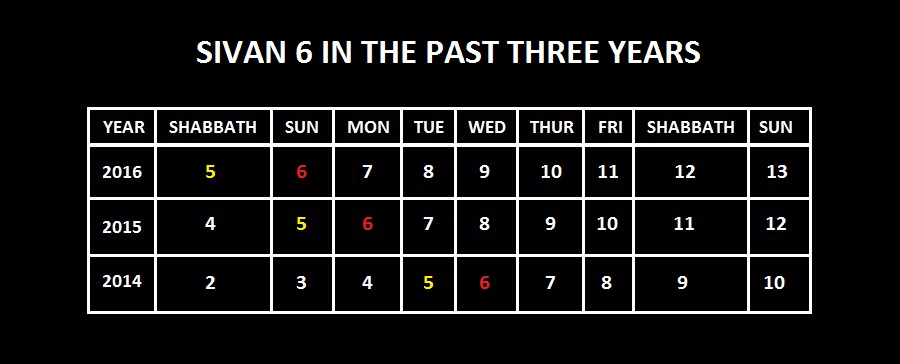
According to the Torah, the forty ninth day is to occur on the Shabbath day, the seventh day of the Biblial weekly calendar, and the fiftieth day is to occur on the Biblcial first day of the new Biblical week. With the exception of 2016, Sivan 5, the traditional 49th day, is not on the Shabbath day. That means that the traditional Sivan 6 day for Shavuoth, with rare exception, is incorrect.
These next two charts, both in the artistry style of Mark Biltz, will provide understanding why it is that the fiftieth day falls on Saturday night, and not just any day where Sivan 6 occurs, year by year. The first chart is the Biblical chart hwhy Commanded in the Torah. The Shabbath numbers are highlighted in yellow, and the fiftieth day of Shavuoth is highlighted in red
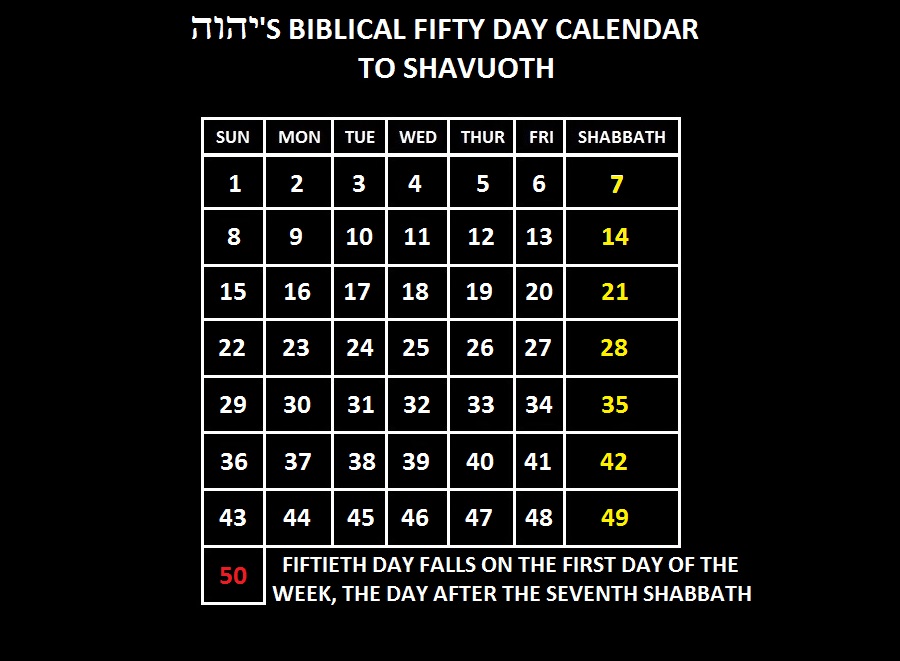
The purpose of this chart is to show that hwhy made the seventh day ordinals to fall on the Shabbath: "7, 14, 21, 28, etc". If anyone at one time, somehow, miscounts a day (remember, there were no printed calendars back then), and doesn't know what day they are to be, they can figure out what day the count is on the Shabbath, which has the seventh ordinal day to fall to. If they were on, say, the 40th day, and they were counting 39. They can look at the Shabbath day that has the seventh ordinal day "42", and realize that they need to be on "40". hwhy structured it for us to depend on the Shabbath ordinal day, because it has the structured "seventh day ordinal".
This next chart will reveal the Judaica Calendar's structure of the fifty day count to Shavuoth, based on the fiftieth day they structured to be Shavuoth. This is from the 2014 calendar (USA Lunar based), with the seventh day ordinals highlighted in yellow, and the fiftieth day highlighted in red
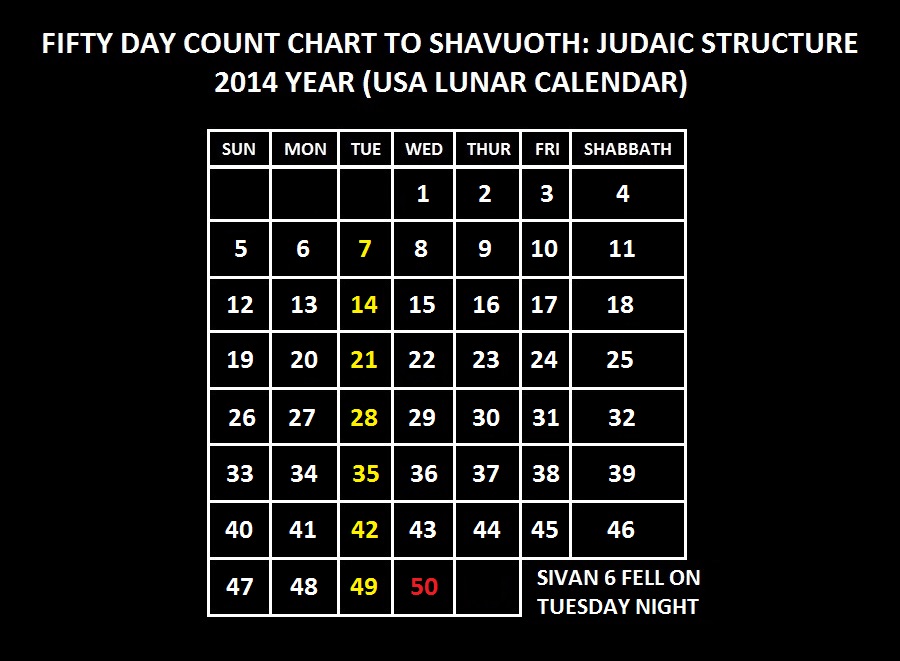
It shows that the fiftieth day falls on a Tuesday night, the fourth day, and the forty ninth day does not fall on a Shabbath. Also the seventh day ordinals do not fall on the Shabbath. There was not structured calendar in which the Israelites could post on their walls, but they have to depend on the sunset to count the next. Not depending on the date Sivan 6, if someone at that time miscounts, and they don't know what the true fiftieth day is. They will be guessing for the next days, and don't know if they will hit the fiftieth day, because they don't have the seventh day ordinal to fall on the Shabbath. This Judaica Calendar changes year by year, and the People will be guessing every year if they will get the counting to the fiftieth day right, or not.

Looking at verse seventeen again of this week's Torah portion passage
17 From your dwellings you shall bring two Breads of the Wave Offering, they shall be two tenths of flour; they shall be baked of leavened bread; the First Fruits to hwhy.
They are to bring "leavened bread". Why did hwhy allow them to make leavened bread instead of unleavened bread? One thing I realized is that the basic reason that hwhy required them to make leavened bread is to make a distinction between the bread required for the Feast of Shavuoth and the bread required for Passover and the Feast of Unleavened Bread. hwhy did not want to have all of these Spring High Holy Days requiring unleavened bread as the main part of the feast. Unleavened bread on Shavuoth would take away the emphasis of the Passover and the Feast of Unleavened Bread. So hwhy made a unique requirement for Shavuoth by having "leavened bread".
Looking at the word LEAVENED BREAD
The Hebrew word for leavened bread is "khah-meyts"- Khet, Mem, Tsade Sophit (Umx). It is from Strong's Concordance number 2557, and its definition
From H2556; ferment, (figuratively) extortion: - leaven, leavened (bread).
from 2556 "khah-meyts" (Umx), and its definition
A primitive root; to be pungent; that is, in taste (sour, that is, literally fermented, or figuratively harsh), in color (dazzling): - cruel (man), dyed, be grieved, leavened.
Also in this verse, in the Hebrew text, the word "they" in Hebrew is "tee-h'yey-nah"- Tav, Heh, Yod, Yod, Nun, Heh (hnyyht). It is from Strong's Concordance number 1961 "ha-yah" (hyh). The Tav in the beginning and the Nun and Heh in the end (hnyyht) reveals that the "Tav" in the phoenetic "tee-" (t) and the Nun-Heh (hn) in "tee-h'yeynah" is in the 3rd person feminine plural form, and this word is a Qal, Strong Future binyan verb in the 3rd person feminine plural form.
Also, in verse sixteen, the new Food Offering is from the time of the Wheat Harvest. A great example of the Wheat Harvest time account of Shavuoth is in the book of Ruth, because in this Ruth's passage of the story, it pertains to the High Holy Day of Shavuoth
Ruth 2:22 And Naomi said unto Ruth her daughter-in-law, It is good, my daughter, that thou go out with his maidens, that they meet thee not in any other field. 23 So she kept fast by the maidens of Boaz to glean unto the end of Barley Harvest and of Wheat Harvest; and dwelt with her mother-in-law.
Numbers 28:26-31
Num 28:26 And on the day of the First Fruits, in your bringing near a Renewed Donation Offering (Tribute Offering, Food Offering, Grain Offering) to hwhy, in your Weeks (Shavuoth), shall be a Sacred (Holy) Calling (Convocation) to you; you shall not do any work of service: 27 and you shall bring near an Elevation Offering (Ascension Offering, Burnt Offering) for a pleasant scent to hwhy; two bullocks of sons of a herd, one ram, seven sheep of sons of a year; 28 and their Donation Offering (Food Offering, Grain Offering) of flour mixed (overflowed) in the oil of three tenths for the one bullock, two tenths for the one ram, 29 a tenth, a tenth, for the one sheep, for the seven sheep; 30 one goat of the kids to atone upon you, 31 from by apart of the Continual Elevation Offering (Ascension Offering, Burnt Offering) and his Donation Offering (Tribute Offering, Food Offering, Grain Offering), you shall do, they shall be perfect for you, and their Drink Offerings (Libation Offerings).
This is a simplified format of the sacrifices of the Shavuoth offering
THE FIRSTFRUITS (SHAVUOTH) SACRIFICES:
A New Food Offering- This is because the wheat has just ripened for harvest, and the firstfruits of the wheat is to be used for The Food Offering mentioned below.
THE ELEVATION OFFERING:
*Two perfect bullocks, sons of a herd.
*One perfect ram.
*Seven perfect lambs, sons of a year.
THE NEW FOOD OFFERING:
*For each bullock: 3/10 ephah of fine flour mixing in oil
(3/10 x 2 = 6/10 ephah).
*For the one ram: 2/10 ephah of fine flour mixing in oil.
*For each lamb: 1/10 ephah of fine flour mixing in oil
(1/10 x 7 = 7/10 ephah).
THE DRINK OFFERING:
*For each bullock: 1/2 of the hin of wine
(1/2 x 2 = 1 hin).
*For the one ram: 1/3 of the hin of wine.
*For each lamb: 1/4 of the hin of wine
(1/4 x 7 = 1 3/4 hins).
THE SIN OFFERING FOR ATONEMENT:
*One perfect kid of the goat.
THE DAILY FIRE OFFERING:
*Without The Daily Food Offering.
This High Holy Day also goes without The Daily Food Offering, because in the book of Leviticus, Shavuoth requires two leavened breads to be offered to the priest.
This High Holy Day of Shavuoth is one of the requirements for the males to be in Jerusalem, which is noted in the book of Exodus
Exodus 23:14, 16-17
Exo 23:14 Three footings (walkings, [times]) you will feast to Me in the year.... 16 And the Feast of the Harvest, the firstfruits of your doings (works), which you have sown in the field:... 17 Three times in the year shall all of your males (remembered ones) appear to the Face of the Adon hwhy.
It says it again later in the book of Exodus
Exodus 34:22-24
Exo 34:22 And you shall do for yourself the Feast of Weeks of the first fruits of the harvest of wheat, and the Feast of the Ingathering of the cycle of the year. 23 Three times in the year shall all of your males see ta-the Face of the Adon (Lord, Master) hwhy, Elohim of Israel. 24 For I will dispossess nations from your face, and I will broaden ta-your border: and a man shall not (desire, delight, lust) ta-your land in your ascending to see (appear at) ta-the Face of hwhy, your Elohim, three times in the year.
Looking at the word WEEKS
The Hebrew word for weeks is "shah-voo-ah" Shin, Bet, Ayin (ebs). In the actual Hebrew text word, it is "shavoo-oth", adding a Tav (tebs). It is from Strong's Concordance number 7620, and its definition
Properly passive participle of H7650 as a denominative of H7651; literally sevened, that is, a week (specifically of years): - seven, week.
from 7651 "sheh-vah" (ebs), and its definition
From H7650; a primitive cardinal number; seven (as the sacred full one); also (adverbially) seven times; by implication a week; by extension an indefinite number: - (+ by) seven ([-fold], -s, [-teen, -teenth], -th, times). Compare H7658.
from 7650 "shah-vah" (ebs), and its definition
A primitive root; properly to be complete, but used only as a denominative from H7651; to seven oneself, that is, swear (as if by repeating a declaration seven times): - adjure, charge (by an oath, with an oath), feed to the full [by mistake for H7646], take an oath, X straitly, (cause to, make to) swear.
Weeks literally means "sevens".
SHAVUOTH ACCOUNTS IN ISRAEL
This has been made known recently. I have yet to find anyone configuring these accounts.
Looking at this account of Moses, which is noted in the book of Deuteronomy
Deuteronomy 1:3
Deu 1:3 And was in the fortieth year, in the tenth ten (tenthteen, eleventh) renewed month, on the one of the renewed month, Moses spoke to the Sons of Israel according to (as) all which hwhy commanded him to them;
This was thirty eight years after the Israelites departure from Kadesh after they hearkened to the ten spies' evil report that cost the generation their passage to go to the promised land by wandering in the wilderness for a total of forty years.
Based on the scriptures, we can calculate when Moses died.
When Moses died, the Israelites mourned for Moses' death for thirty days, which is noted in the book of Deuteronomy
Deuteronomy 34:7-9
Deu 34:7 And Moses was a son of a hundred and twenty years in his death: his eye had not faint (dimmed), and the freshness (force, ?vigor?) had not fled. 8 And the Sons of Israel wailed (wept) of ta-Moses in the going overs (plains) of Moab thirty days: and the days of weeping and mourning for Moses had ended. 9 And Joshua, son of Nun, was full of the Spirit of Wisdom; for Moses had supported (laid) ta-his hands upon him: and the Sons of Israel, they listened to him, and they did as the which hwhy commanded ta-Moses.
After the death of Moses and their time for mourning, hwhy spoke for the first time to Joshua, which is noted in the book of Joshua
Joshua 1:1-3, 10-11
Jos 1:1 And was after the death of Moses the servant of hwhy, and hwhy spoke to Joshua, son of Nun, the minister of Moses, to say, 2 Moses my servant is dead; and now arise, go over this Jordan, you, and all this People, to the land which I am giving to them, to the Sons of Israel. 3 Every place which you shall tread the sole of your foot on him, to you I have given him, as which I spoke to Moses....10 And Joshua commanded the Officers of the People, to say, 11 Go over in the midst of the Camp, and command the People, to say, Provide for yoursevles victuals; for in still of three days you are going over this Jordan, to go to possess the land, which hwhy, your Elohim, is giving to you to possess her.
and later in the book of Joshua, it says
Joshua 4:19
Jos 4:19 And the People, they ascended from the Jordan in the tenth of the first month, and they encamped in the Gilgal, in the edge, east of Jericho.
Computing the days, this takes the time line that hwhy spoke to Joshua before they crossed over the Jordan on the seventh day of the first month of the forty-first year. With the record of the book of Deuteronomy that they mourned for thirty days for the death of Moses, we can calculate the date back thirty days to the seventh day of the twelfth month of Adar. I misconfigured the date as the first day of the twelfth month that Moses was born. I want to give credit is due and want to thank Mark Biltz of El Shaddai Ministries for correcting me on his birth date. Thank you Mark.
THIS IS A REVELATION!!!
I have yet to find anyone configuring this account.
Now that the date of Moses' birth is clear, going back to this time line account in the book of Exodus
Exodus 2:1-9
Exo 2:1 And a man from the house of Levi went, and took ta-a daughter of Levi. 2 And the woman, she conceived, and she birthed a son: and she saw him that he was good [(he was for goodness)], she tsaphan-hid him three months. 3 And was not able anymore at the hiding of him, and she took for him an ark of papyrus (bulrush, absorbent material), and she daubed her in the slime (bitumen) and in the pitch (asphalt), and she set ta-the lad (male child) in her; and she was set in the reeds upon the lip of the river. 4 And his sister, she stood from a distance to know what would be done to him. 5 And the daughter of Pharaoh, she descended (went down) to wash upon the river; And her young women were walking upon the hand of the river; and she saw ta-the ark in the midst of the reeds, and she sent ta-her female servant, and she took her. 6 And she opened her, and she saw him, ta-the lad (male child): and behold, a young boy was weeping. And she had compassion (pity) upon him, and she said, This one is from the lads (male children) of the Hebrews. 7 And his sister, she said to the daughter of Pharaoh, I can go, and I can call a wet nurse from the Hebrew women for you, and she may wet nurse ta-the lad (male child) for you. 8 And the daughter of Pharaoh, she said to her, Go. And the maiden (virgin, secret young girl), she went and she called ta-the mother of the lad (male child). 9 And the daughter of Pharaoh, she said to her, Go (Walk) ta-this lad (male child), and wet nurse him for me, and I, I will give ta-your wages. And the woman, she took the lad (male child), and she wet nursed him.
Since we know now he was born on the seventh day of the twelfth month. He was hidden by his mother, Jochebed, for three months, and this would take it to, at the earliest date, the seventh day of the third month of Sivan. Resarching further, with a very strong probability (of 99.9% surity), we can figure out that the day Moses was put in a pitched basket and sent down the Nile being found by the Pharaoh's daughter was on the High Holy Day of SHAVUOTH!!!, also known as PENTECOST. This account of Moses being drawn out of the water was a type and shadow of Moses' "spiritual rebirth" which will be shown later.
!!!hwhy Kl dbk
There is another account that could have possibly occurred on the time of Shavuoth, which is noted in the book of Numbers
Numbers 13:17-20
Num 13:17 And was, in Pharaoh sending away ta-the People, and Elohim did not lead them of the way of the land of the Philistim, for he was near; for Elohim said, Lest the People shall repent [(shall be sorry)] in their seeing battle (war) and they will return to Egypt: 18 And Elohim circumvented (turned) ta-the People the way of the wilderness of the Sea of Reeds: And the armed Sons of Israel ascended from the land of Egypt. 19 And Moses took ta-the bones of Joseph with him: for that swearing, swore ta-the Sons of Israel, to say, Elohim, visiting, will visit you; and you shall ascend ta-my bones from this (here) with you. 20 And they pulled up (journeyed) from Succoth, and they camped in Etham in the edge of the wilderness.
We have a good idea when the days of the firstfruits of grapes, which is noted in the book of Numbers
Numbers 10:11 And was in the second year, in the second renewed month, on the twenty (twentieth) on the renewed month, the Cloud ascended (taken up) from upon (from over) the Tabernacle of the Testimony (Witness).... 33 And they pulled up (journeyed) from the Mountian of hwhy, a course (way) of three days:...
They left Mount Sinai on the twentieth day of the second Biblical month of Ziv/Iyar, and the three days journey will take it to the twenty second or twenty third day of the second month of Ziv/Iyar. The next dateline is mentioned when Miriam was plagued for seven days, which is noted in the book of Numbers
Numbers 12:15 And Miriam, she was shut out from outside by the Camp seven days: and the People did not pull up (journey) until the gathering of Miriam. 16 And afterwards, the People, they pulled up (journeyed) from Hazeroth, and encamped in the Wilderness of Paran.
This would take it to, at earliest, the twenty ninth day of the second month of Ziv/Iyar. It doesn't say how long it took, but it's most likely that they arrived within the first week of the third Biblical month of Sivan. This would make it a possible time frame that the Israelites arrived at the location on Shavuoth.
Looking at this account, which is noted in the book of Exodus
Exodus 17:1-6
Exo 17:1 And all of the Congregation of the Sons of Israel, they pulled up (journeyed) from the Wilderness of Sin, by their journeys upon the Mouth of hwhy, and they camped in Rephidim: and was no water for the People to drink. 2 And the People contended (strived) with Moses, and they said, Give water to us, and we may drink! And Moses said to them, Why (How) are you contending with me? Why (How) are you testing (tempting) ta-hwhy?! 3 And the People thirsted there for the water; and the People murmured upon (over) Moses, and said, To what is this that you have ascended us from Egypt to have me dead, and ta-my sons, and ta-my livestock on the thirst? 4 And Moses cried to hwhy, to say, What shall I do to this People? Yet a little and they will skullstone (stone) me. 5 And hwhy said to Moses, Go over to the face of the People, and take from the Elders of Israel with you; And your staff (rod, branch) which you struck ta-the river on him, take in your hand, and you go. 6 Behold, I will stand to your face there upon the cliff rock in Horeb; and you shall strike on the cliff rock, and water shall come out from him, and the People may drink. And Moses did so to the eyes of the Elders of Israel.
These are some images of the Split Rock, located in northeastern Saudi Arabia
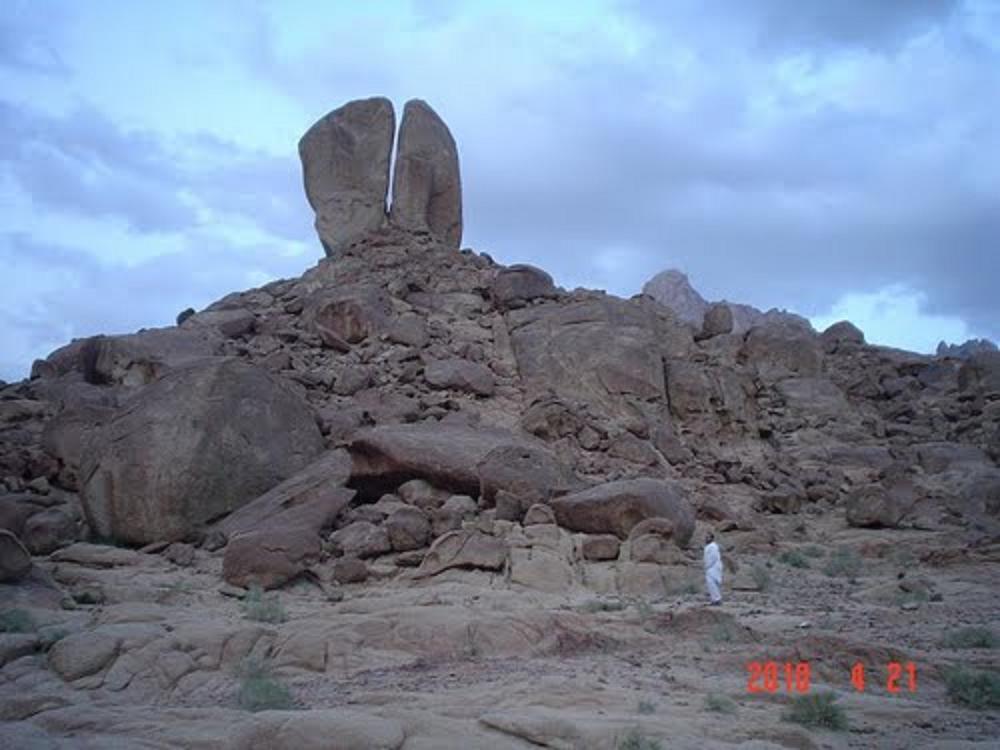
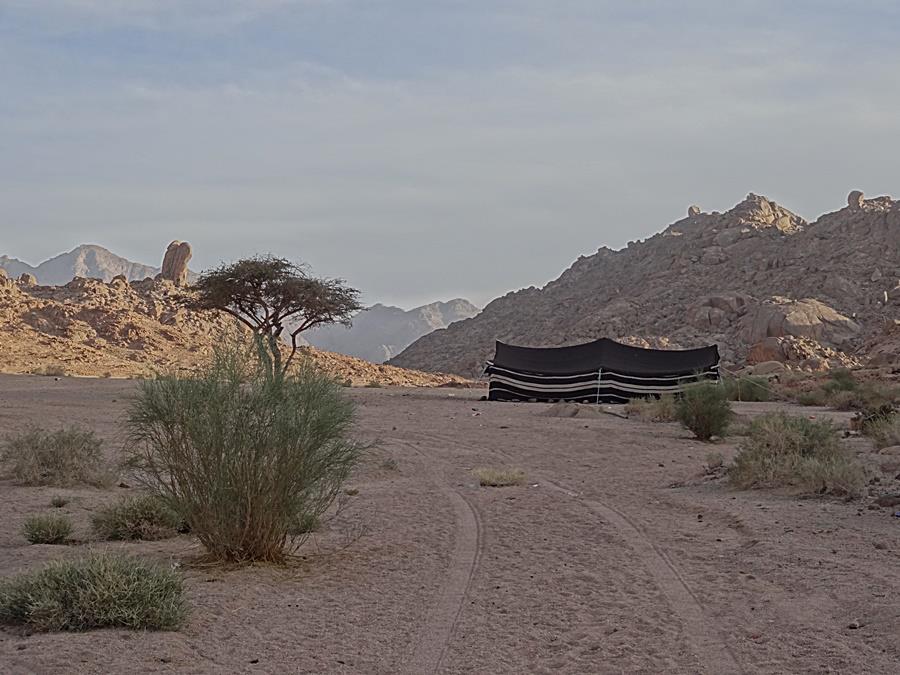
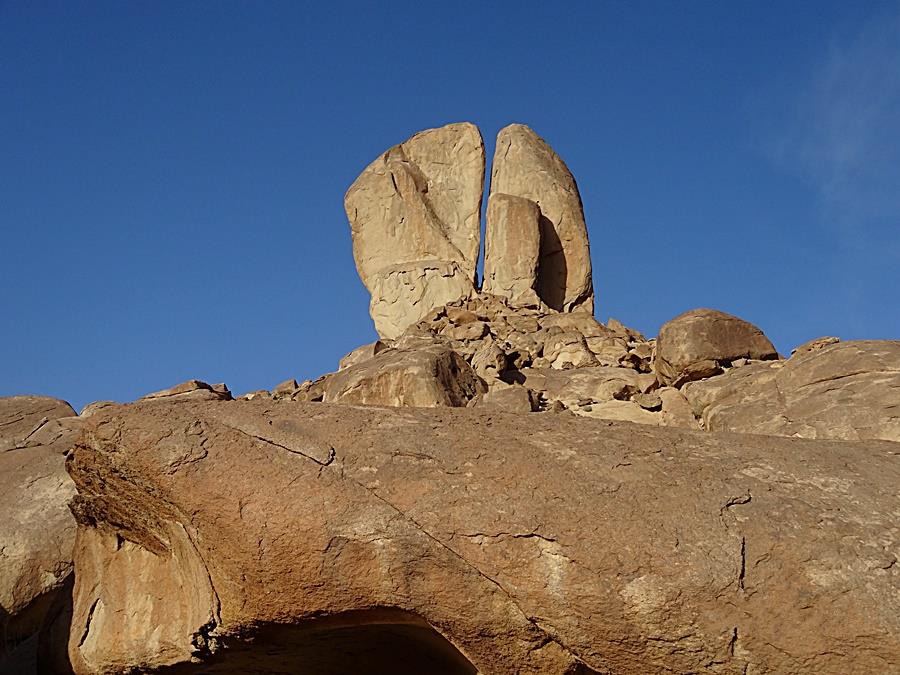
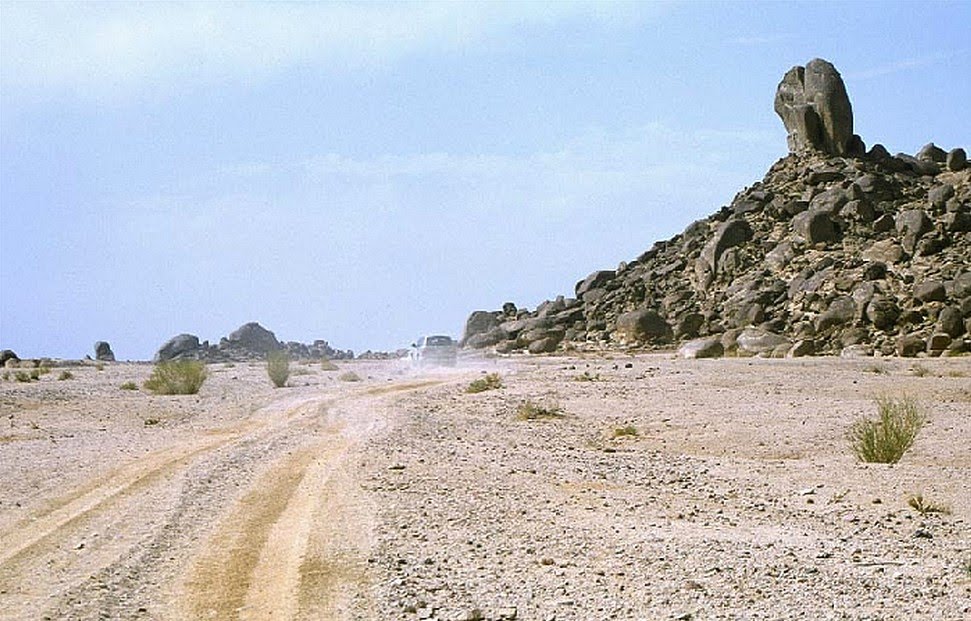
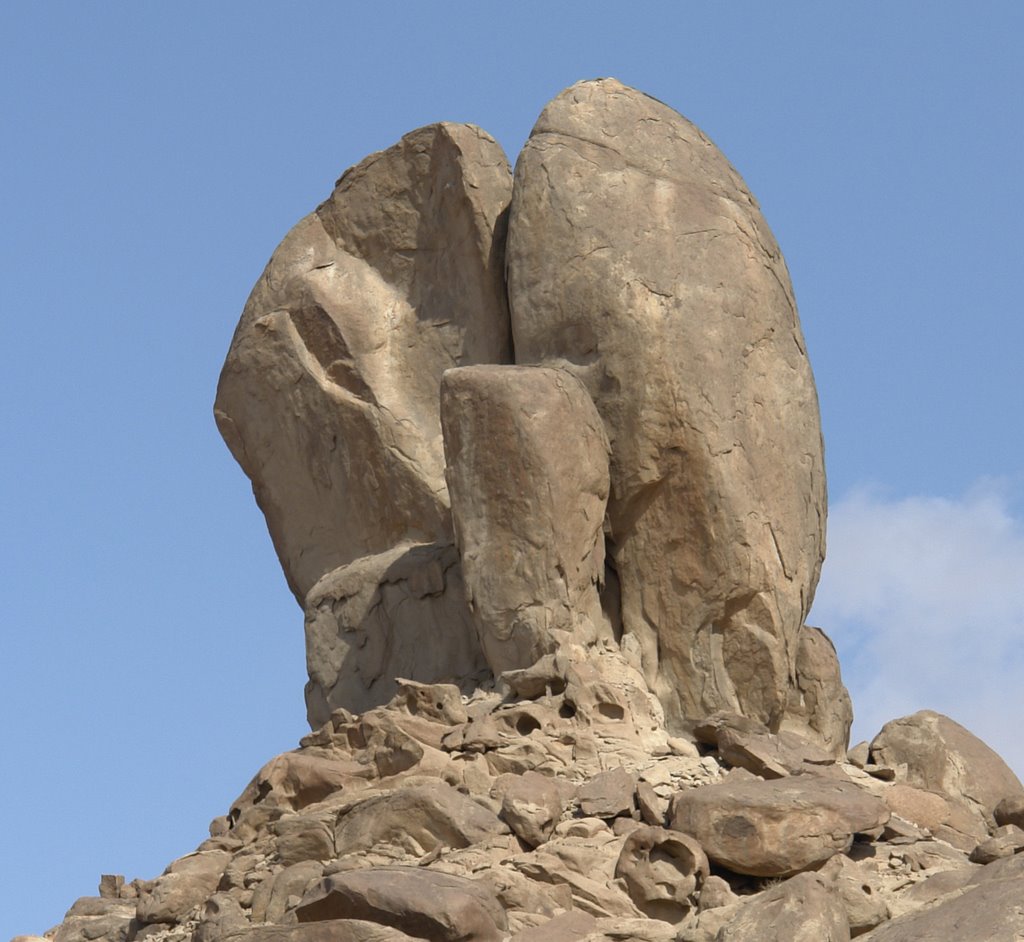

This is an artist's conception of what the water gushing might have looked like
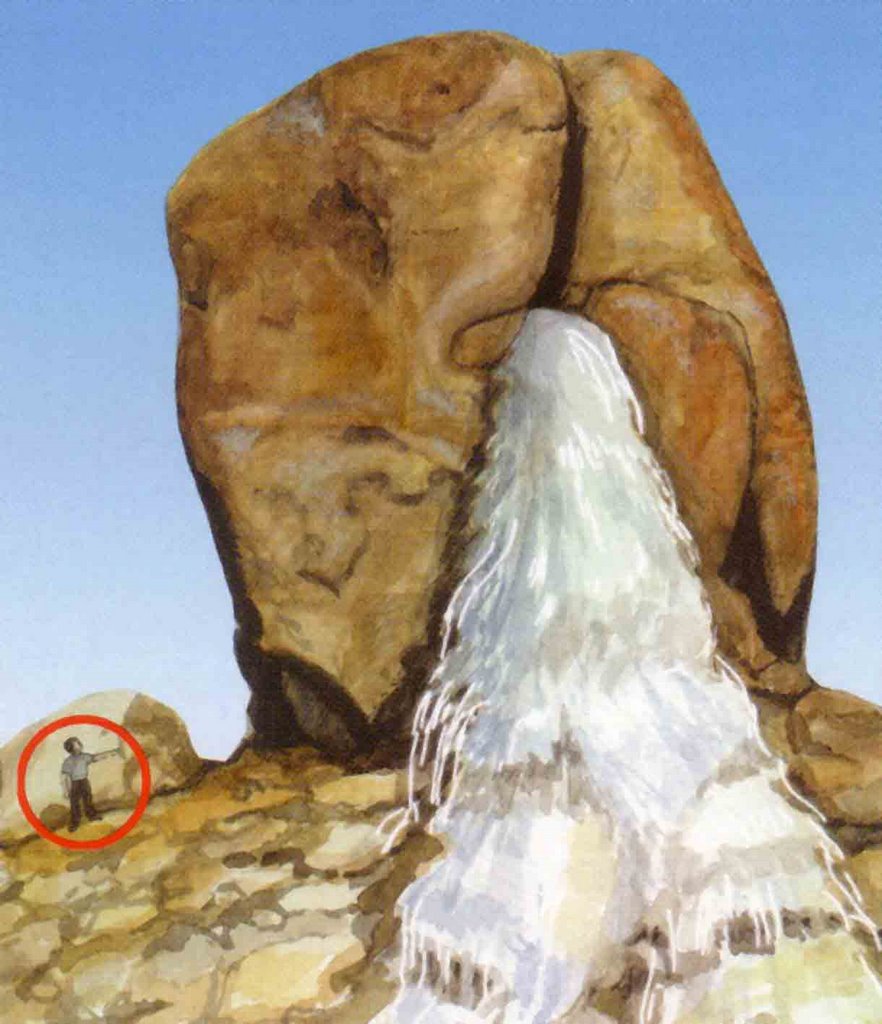
This is one of Ron Wyatt's members standing in front of rock close up. It gives one an awe of the massive act hwhy did for the Israelites
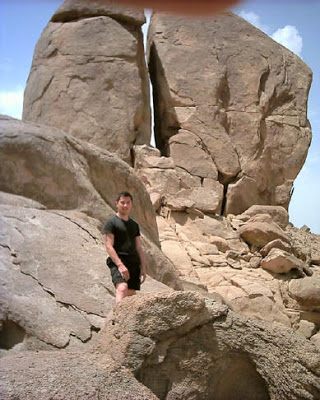

This is another comparison image of a human to the Split Rock
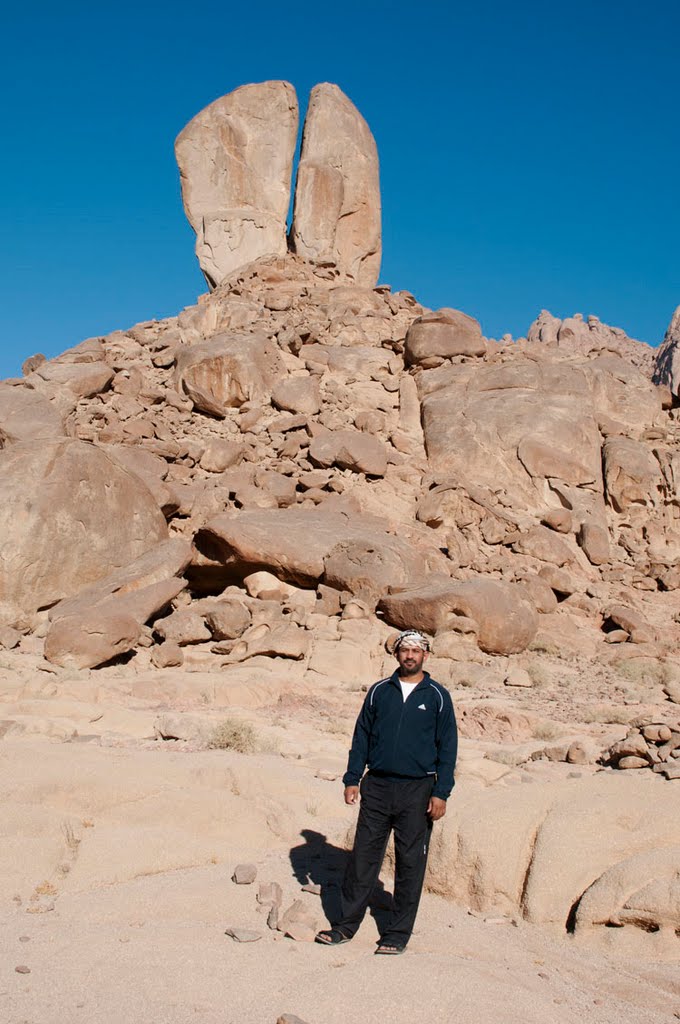
How awesome are you hwhy!
In my humble opinion, this account most likely occurred during the Feast of Shavuoth, which I will explain later.
If anyone has not yet known, the book of Ruth is a story that occurred around the time of Shavuoth. This was a story of a Moabitess' marriage vow to the Israelite people and to hwhy.
This is the most famous line of Ruth
Ruth 1:16
Rut 1:16 And Ruth said, Intreat me not to leave thee, or to return from following after thee: for whither thou goest, I will go; and where thou lodgest, I will lodge: thy People shall be my People, and thy Elohim my Elohim:
Read the book of Ruth during Shavuoth. It makes a great traditional activity during this High Holy Day.
Alan Horvath of AlanHorvath.com revealed the symbolic meanings to certain characters in the book of Ruth:
Naomi: Israel, hwhy's widow
Ruth: Called out ones of believers, the Holy Ones, in Yeshua, the Messiah, as His gentile Bride (also to me, she is the Bride of Messiah in the world who wants to follow hwhy and His Word)
Orpah: The many who part ways with hwhy in the crossroads, leaving way and heading straight to the broad road (also a gentile who refuses to follow Yeshua)
Boaz: Yeshua, our Kinsman Redeemer
Unnamed Servant of Boaz: The Ruakh HaKodesh (the Holy Spirit), like Eliezer, Abraham's senior servant, also symbolized as the Ruakh HaKodesh (the Holy Spirit) for finding Rebekah as Isaac's bride
The Threshing Floor: The seven years tribulation (this could be. Also to me, I think it's symbolic of the gathering of the believers of Yeshua in the field for the harvest time, comparing to Matthew 9:37-38 and Luke 10:2)
hwhy revealed to me these other characters' symbolic meanings in the book of Ruth:
Land of Moab: The world
Ruth's Closer Kinsman Redeemer: The Anti Messiah
Looking at the following names in the book of Ruth:
Elimelech (In Hebrew "Eh-lee-meh-lekh" (Klmyla) S458 [410 + 4428]): El of the king
Naomi (In Hebrew "Nah-ah-mee" (ymen) S5281): Pleasant
Marah (In Hebrew "Marah" (arm) S4755): Bitter
Mahlon (In Hebrew "Makh-lohn" (Nwlxm) S4248): Sick
Chilon (In Hebrew "Keel-yohn" (Nwylk) S3630, 3615): Pining, destruction, failing
Orpah (In Hebrew "Ahr-pah" (hpre) S6204): Mane, nape or back of the neck (as declining), back, neck, figuratively stiff necked
Ruth (In Hebrew "Rooth" (twr) S7327): Friend, neighbor
Boaz (In Hebrew "Boh-ahz" (zeb) S1162): Unkown [possibly a combination from S1156, 1158 b'ah (heb) Seek, desire, and S5794 "ahz" (ze): Strength, power, might, greed: hence, seeking strength]
So while your reading the book of Ruth during this Appointed Time High Holy Day of this harvest feast day, realize these symbolic meanings when you come upon each of them.
SHAVUOTH IN THE BRITH KHADASHAH (THE NEW COVENANT)
In the Brith Khadashah (the New Covenant), Yeshua also followed this Commandment in going to Jerusalem for the wheat harvest on the Feast of Shavuoth, which is noted in the whole fifth chapter of the Gospel of John
John 5:1-47
Joh 5:1 After this there was a Feast of the Jews [Shavuoth (Pentecost)]; and Yeshua went up to Jerusalem. 2 Now there is at Jerusalem by the sheep market a pool, which is called in the Hebrew tongue Bethesda, having five porches. 3 In these lay a great multitude of impotent folk, of blind, halt, withered, waiting for the moving of the water. 4 For an angel went down at a certain season [Shavuoth (Pentecost)] into the pool, and troubled the water: whosoever then first after the troubling of the water stepped in was made whole of whatsoever disease he had. 5 And a certain man was there, which had an infirmity thirty and eight years. 6 When Yeshua saw him lie, and knew that he had been now a long time in that case, He saith unto him, Wilt thou be made whole? 7 The impotent man answered Him, Sir, I have no man, when the water is troubled, to put me into the pool: but while I am coming, another steppeth down before me. 8 Yeshua saith unto him, Rise, take up thy bed, and walk. 9 And immediately the man was made whole, and took up his bed, and walked: and on the same day was the Shabbath [the High Shabbath]. 10 The Jews therefore said unto him that was cured, It is the Shabbath day [the High Shabbath day]: it is not lawful for thee to carry thy bed. 11 He answered them, He that made me whole, the same said unto me, Take up thy bed, and walk. 12 Then asked they him, What Man is that which said unto thee, Take up thy bed, and walk? 13 And he that was healed wist not who It was: for Yeshua had conveyed Himself away, a multitude being in that place. 14 Afterward Yeshua findeth him in the Temple, and said unto him, Behold, thou art made whole: sin no more, lest a worse thing come unto thee. 15 The man departed, and told the Jews that it was Yeshua, which had made him whole.
16 And therefore did the Jews persecute Yeshua, and sought to slay Him, because He had done these things on the Shabbath day [Shavuoth (Pentecost)]. 17 But Yeshua answered them, My Father worketh hitherto, and I work. 18 Therefore the Jews sought the more to kill Him, because He not only had broken the Shabbath [Shavuoth (Pentecost)], but said also that Elohim was His Father, making Himself equal with hwhy. 19 Then answered Yeshua and said unto them, Verily, verily, I say unto you, The Son can do nothing of Himself, but what he seeth the Father do: for what things soever He doeth, these also doeth the Son likewise. 20 For the Father loveth the Son, and sheweth Him All Things that Himself doeth: and He will shew Him Greater Works than these, that ye may marvel. 21 For as the Father raiseth up the dead, and quickeneth them; even so the Son quickeneth whom He will. 22 For the Father judgeth no man, but hath committed all judgment unto the Son: 23 That all men should honour the Son, even as they honour the Father. He that honoureth not the Son honoureth not the Father which hath sent Him. 24 Verily, verily, I say unto you, He that heareth My Word, and believeth on Him that sent Me, hath Everlasting Life, and shall not come into condemnation; but is passed from death unto life. 25 Verily, verily, I say unto you, The hour is coming, and now is, when the dead shall hear the voice of the Son of Elohim: and they that hear shall live. 26 For as the Father hath Life in Himself; so hath He given to the Son to have Life in Himself; 27 And hath given Him authority to execute judgment also, because He is the Son of Man. 28 Marvel not at this: for the hour is coming, in the which all that are in the graves shall hear His Voice, 29 And shall come forth; they that have done good, unto the Resurrection of Life; and they that have done evil, unto the Resurrection of Damnation. 30 I can of Mine own self do nothing: as I hear, I judge: and My Judgment is just; because I seek not Mine own will, but the Will of the Father which hath sent Me. 31 If I bear witness of Myself, My Witness is not true. 32 There is another that beareth witness of Me; and I know that the witness which he witnesseth of Me is true. 33 Ye sent unto John, and he bare witness unto the Truth. 34 But I receive not testimony from man: but these things I say, that ye might be saved. 35 He was a burning and a shining light: and ye were willing for a season to rejoice in his light. 36 But I have Greater Witness than that of John: for the Works which the Father hath given Me to finish, the same Works that I do, bear witness of Me, that the Father hath sent Me. 37 And the Father Himself, which hath sent Me, hath borne witness of Me. Ye have neither heard His Voice at any time, nor seen His Shape. 38 And ye have not His Word abiding in you: for whom He hath sent, Him ye believe not. 39 Search the Scriptures; for in them ye think ye have Eternal Life: and they are they which testify of Me. 40 And ye will not come to Me, that ye might have Life. 41 I receive not honour from men. 42 But I know you, that ye have not the Love of hwhy in you. 43 I am come in My Father's Name, and ye receive Me not: if another shall come in his own name, him ye will receive. 44 How can ye believe, which receive honour one of another, and seek not the honour that cometh from hwhy only? 45 Do not think that I will accuse you to the Father: there is one that accuseth you, even Moses, in whom ye trust. 46 For had ye believed Moses, ye would have believed Me: for he wrote of Me. 47 But if ye believe not his writings, how shall ye believe My Words?
There are some that say this Gospel account occurred on the Feast Purim. The reason it is not on Purim, becuase that feast was a general Jewish feast which occurred during Babylonian captivity. This was when the Jewish people were not in Israel, and it did not have anything to do with the Temple. Wheras, according to the Torah, this was one of the three High Holy Days required in the year, the Feast of Shavuoth, where the Israelite males were required to go to Jerusalem. Yeshua, an Israelite male, also had to visit Jerusalem three times in the Biblical year, as required in the Torah, including the Feast of Shavuoth.
When it says that it was on the Shabbath day, it meant the High Shabbath day, on the fiftieth day on Shavuoth, the Bilbical first day of the Biblical week, where no one is to work that day. Also, Yeshua revealed that He was at the Temple which is required for all males to be during the Feast of Shavuoth.
!!!hwhy Kl dbk
Also, this guy at the pool during the time of Shavuoth, where the pool was stirred by an angel to give someone "new life" and "spiritual rebirth", was also given spiritual rebirth by Yeshua's command to walk again. The location of this Shavuoth account was like Moses being drawn out by the Pharaoh's daughter from the Nile during the same time of Shavuoth.
This is the account of Yehsua's fulfillment of Shavuoth, which is noted in the book of the Acts
Acts 2:1-41
Act 2:1 And when the day of Pentecost (Shavuoth) was fully come, they were all with one accord in one place. 2 And suddenly there came a Sound from the heavens as of a rushing mighty wind, and it filled all of the house where they were sitting. 3 And there appeared unto them cloven tongues like as of fire, and it sat upon each of them. 4 And they were all filled with the Holy Spirit, and began to speak with other tongues, as the Spirit gave them utterance. 5 And there were dwelling at Jerusalem Jews, devout men, out of every nation under the heavens. 6 Now when this was noised abroad, the multitude came together, and were confounded, because that every man heard them speak in his own language. 7 And they were all amazed and marvelled, saying one to another, Behold, are not all these which speak Galilaeans? 8 And how hear we every man in our own tongue, wherein we were born? 9 Parthians, and Medes, and Elamites, and the dwellers in Mesopotamia, and in Judaea, and Cappadocia, in Pontus, and Asia, 10 Phrygia, and Pamphylia, in Egypt, and in the parts of Libya about Cyrene, and strangers of Rome, Jews and proselytes, 11 Cretes and Arabians, we do hear them speak in our tongues the wonderful works of hwhy. 12 And they were all amazed, and were in doubt, saying one to another, What meaneth this? 13 Others mocking said, These men are full of new wine. 14 But Peter, standing up with the eleven, lifted up his voice, and said unto them, Ye men of Judaea, and all ye that dwell at Jerusalem, be this known unto you, and hearken to my words: 15 For these are not drunken, as ye suppose, seeing it is but the third hour of the day. 16 But this is that which was spoken by the prophet, Joel; 17 And it shall come to pass in the last days, saith hwhy, I will pour out of My Spirit upon all flesh: and your sons and your daughters shall prophesy, and your young men shall see visions, and your old men shall dream dreams: 18 And on my servants and on my handmaidens I will pour out in those days of My Spirit; and they shall prophesy: 19 And I will shew wonders in the heavens above, and Signs in the earth beneath; blood, and fire, and vapour of smoke: 20 The sun shall be turned into darkness, and the moon into blood, before that Great and Notable Day of hwhy come: 21 And it shall come to pass, that whosoever shall call on the Name of hwhy shall be saved. 22 Ye men of Israel, hear these words; Yeshua of Nazareth, a man approved of hwhy among you by miracles and wonders and signs, which hwhy did by Him in the midst of you, as ye yourselves also know: 23 Him, being delivered by the determinate counsel and foreknowledge of hwhy, ye have taken, and by wicked hands have crucified and slain: 24 Whom hwhy hath raised up, having loosed the pains of death: because it was not possible that He should be holden of it. 25 For David speaketh concerning Him, I foresaw hwhy always before my face, for he is on my right hand, that I should not be moved: 26 Therefore did my heart rejoice, and my tongue was glad; moreover also my flesh shall rest in hope: 27 Because thou wilt not leave my soul in hell, neither wilt thou suffer thine Holy One to see corruption. 28 Thou hast made known to me the ways of life; thou shalt make me full of joy with thy countenance. 29 Men and brethren, let me freely speak unto you of the patriarch, David, that he is both dead and buried, and his sepulchre is with us unto this day. 30 Therefore being a prophet, and knowing that hwhy had sworn with an Oath to him, that of the fruit of his loins, according to the flesh, He would raise up Messiah to sit on His Throne; 31 He seeing this before spake of the resurrection of Messiah, that his soul was not left in hell, neither his flesh did see corruption. 32 This Yeshua hath hwhy raised up, whereof we all are witnesses. 33 Therefore being by the Right Hand of hwhy exalted, and having received of the Father the promise of the Holy Spirit, he hath shed forth this, which ye now see and hear. 34 For David is not ascended into the heavens: but he saith himself, hwhy said unto my Lord, Sit thou on my right hand, 35 Until I make thy foes thy footstool. 36 Therefore let all the house of Israel know assuredly, that hwhy hath made that same Yeshua, whom ye have crucified, both Lord and Messiah. 37 Now when they heard this, they were pricked in their heart, and said unto Peter and to the rest of the apostles, Men and brethren, what shall we do? 38 Then Peter said unto them, Repent, and be baptized every one of you in the Name of Yeshua Messiah for the remission of sins, and ye shall receive the gift of the Holy Spirit. 39 For the promise is unto you, and to your children, and to all that are afar off, even as many as hwhy, our Elohim, shall call. 40 And with many other words did he testify and exhort, saying, Save yourselves from this untoward generation. 41 Then they that gladly received his word were baptized: and the same day there were added unto them about three thousand souls.
On Shavuoth, it was the first time that the Jewish People of various languages from various nations were saved after the Holy Spirit came down on earth and unto the disciples. This is the disciples' "spiritual rebirth" like Moses, and the Man whom Yehsua healed to walk on this same day.
Picking up from earlier to the Split Rock account, looking at the images of the Split Rock, if one looks at the shape of the Split Rock it looks like a "cloven foot".
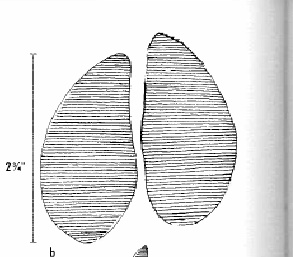
Compare the Split Rock and the deer footprint together

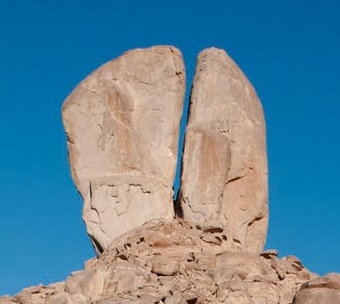
This can also be compared to the Ruakh HaKodesh (the Holy Spirit) that came down on the disciples as fiery "cloven" tongues
Acts 2:3 And there appeared unto them cloven tongues like as of fire, and it sat upon each of them. 4 And they were all filled with the Holy Spirit, and began to speak with other tongues, as the Spirit gave them utterance.
Based on the Israelites' time line on their journey, and the comparison of the shape of the Split Rock to a deer's footprint, it was most likely on Shavuoth that this occurred.
!!!!!hwhy Kl dbk
ANNOTHER ACCOUNT OF SHAVUOTH IN THE BRITH KHADASHAH (THE NEW COVENANT)
Mark Biltz of El Shaddai Ministries has revealed another account of Shavuoth in the Brith Khadashah. He reveals more things than what is displayed, but it is very revealing.
Luke 1:5-23
Luk 1:5 There was in the days of Herod, the king of Judaea, a certain Priest named Zacharias, of the Course of Abia: and his wife was of the daughters of Aaron, and her name was Elisabeth. 6 And they were both righteous before hwhy, walking in all the Commandments and Statutes of hwhy blameless. 7 And they had no child, because that Elisabeth was barren, and they both were now well stricken in years. 8 And it came to pass, that while he executed the Priest's Office before hwhy in the order of his Course, 9 According to the custom of the Priest's Office, his lot was to burn incense when he went into the Temple of hwhy. 10 And the whole multitude of the people were praying without at the time of incense. 11 And there appeared unto him an angel of hwhy standing on the right side of the Altar of Incense. 12 And when Zacharias saw him, he was troubled, and fear fell upon him. 13 But the angel said unto him, Fear not, Zacharias: for thy prayer is heard; and thy wife Elisabeth shall bear thee a son, and thou shalt call his name, John. 14 And thou shalt have joy and gladness; and many shall rejoice at his birth. 15 For he shall be great in the Eyes of hwhy, and shall drink neither wine nor strong drink; and he shall be filled with the Holy Spirit, even from his mother's womb. 16 And many of the children of Israel shall he turn to hwhy their Elohim. 17 And he shall go before him in the spirit and power of Elias, to turn the hearts of the fathers to the children, and the disobedient to the wisdom of the just; to make ready a people prepared for hwhy. 18 And Zacharias said unto the angel, Whereby shall I know this? For I am an old man, and my wife well stricken in years. 19 And the angel answering said unto him, I am Gabriel, that stand in the Presence of hwhy; and am sent to speak unto thee, and to shew thee these glad tidings. 20 And, behold, thou shalt be dumb, and not able to speak, until the day that these things shall be performed, because thou believest not my words, which shall be fulfilled in their season. 21 And the People waited for Zacharias, and marvelled that he tarried so long in the Temple. 22 And when he came out, he could not speak unto them: and they perceived that he had seen a vision in the Temple: for he beckoned unto them, and remained speechless. 23 And it came to pass, that, as soon as the days of his ministration were accomplished, he departed to his own house. 24 And after those days his wife Elisabeth conceived, and hid herself five months, saying, 25 Thus hath hwhy dealt with me in the days wherein he looked on me, to take away my reproach among men.
26 And in the sixth month the angel Gabriel was sent from hwhy unto a city of Galilee, named Nazareth, 27 To a virgin espoused to a man whose name was Joseph, of the house of David; and the virgin's name was Mary. 28 And the angel came in unto her, and said, Hail, thou that art highly favoured, hwhy is with thee: blessed art thou among women. 29 And when she saw him, she was troubled at his saying, and cast in her mind what manner of salutation this should be. 30 And the angel said unto her, Fear not, Mary: for thou hast found favour with hwhy. 31 And, behold, thou shalt conceive in thy womb, and bring forth a Son, and shalt call His Name, YESHUA. 32 He shall be great, and shall be called the Son of the Highest: and hwhy Elohim shall give unto Him the throne of His father, David: 33 And He shall reign over the House of Jacob for ever; and of His Kingdom there shall be no end. 34 Then said Mary unto the angel, How shall this be, seeing I know not a man? 35 And the angel answered and said unto her, The Holy Spirit shall come upon thee, and the Power of the Highest shall overshadow thee: therefore also that Holy Thing which shall be born of thee shall be called the Son of hwhy. 36 And, behold, thy cousin, Elisabeth, she hath also conceived a son in her old age: and this is the sixth month with her, who was called barren. 37 For with hwhy nothing shall be impossible. 38 And Mary said, Behold the handmaid of hwhy; be it unto me according to thy word. And the angel departed from her.
According to Mark Biltz, this account of Zacharias, a Priest, was visited by the angel Gabriel on Shavuoth, and it was at this Appointed Time when Gabriel said that his wife is to bear a son, who would be John the Baptist. To me, this makes sense, because the visitation with Mary took place on Khanukkah, while Elizabeth was six months pregnant. Based on Mark Biltz's revelation, when Elizabeth was one month pregnant, it would have been thirty days after her conception with John, which was the fourth month, and since it would have been after Shavuoth.
With the basis and these sources of Mark Biltz, they prove that Zacharias went in to the Temple on Shavuoth, possibly on the seventh day of Sivan, and on the possible time of the fourteenth day of Sivan, seven days later, John the Baptist was conceived who would later be born on Passover.
You can find Mark Biltz teaching on his Torah portion, Bemidbar at this Livestream webpage, by clicking on the image below to get to the webpage.

A MISNOMER REGARDING AN ACCOUNT ON SHAVUOTH
It is my humble opinion that it was on the seventeenth of the third month of Sivan, the day that hwhy came down on Mount Sinai to Moses and the Israelite people and spoke the Ten Words (Commandments), which was based on the time line, which is noted in the book of Exodus.
Exodus 19:1-2
Exo 19:1 In the third renewed month, on this day to the going out of the Sons of Israel from the land of Egypt, they came at the Wilderness of Sinai. 2 And they journeyed (pulled) up from Rephidim, and they came at the Wilderness of Sinai, and they camped in the wilderness; and Israel camped there at the front of the Mountain.
The fact that it says "this day", meant that it was "the same day" in which the Israelites arrived at Mount Sinai as the day they left Egypt, as we will see in this next account, which is noted in the book of Numbers
Numbers 33:3
Num 33:3 And they pulled up (journeyed) from Rameses in the first renewed month, on the five ten (fiveteen, fifteenth) day of the first renewed month; after the Passover, the Sons of Israel, they went out on a high hand to the eyes of all of the Egyptians.
Based on this account, we can now conclude that the Israelites arrived at Mount Sinai on the fifteenth day of the third month of Sivan, sixty days later, after leaving Rameses. The latest that Shavuoth can occur is on the tenth day of the third month of Sivan, which is five days past its last potention day of the High Holy Day. Based on these accounts, this nullifies the notion that the account of the Israelites receiving the Ten Words (Commandments) occurred on Shavuoth.
_______________________________________________________________________________________________________________________________________________
- - - - - - - - - - - - - - - - - - - - - - - - - - - - - - - - - - - - - - - - - - - - - - - - - - - - - - - - - - - - - - - - - - - - - - - - - - - - - - - - -
DISCLAIMER
The views and opinions expressed, from these different formats of teachings below, are solely those of the personnel and do not necessarily reflect the views or opinions of The Aleph-Tav Project.
- - - - - - - - - - - - - - - - - - - - - - - - - - - - - - - - - - - - - - - - - - - - - - - - - - - - - - - - - - - - - - - - - - - - - - - - - - - - - - - - -
VIDEO TEACHINGS
EDDIE CHUMNEY
Hebraic Heritage Ministries International (HHMI)
The Feast of Shavuot
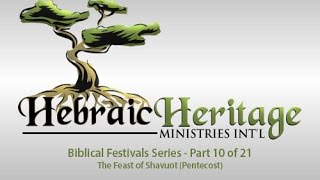
Yeshua The Lawgiver [Shavuot]
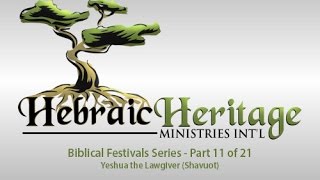
The Marriage Of Messiah To The House Of Jacob [Shavuot]
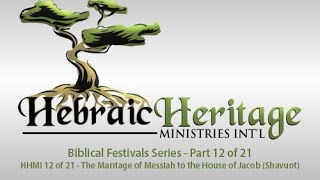
Shavuot: A Change of Heart
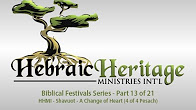
TONY ROBINSON
Restoration of Torah Ministries
Counting of the Omer
Part One
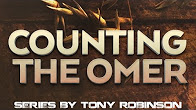
Part Two

JIM STALEY
(Formerly of Passion For Truth Ministries)
Feast of Shavuot (Pentecost) (2013)
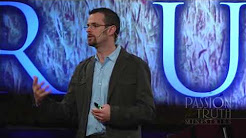
Feast of Shavuot (Pentecost) (2012)
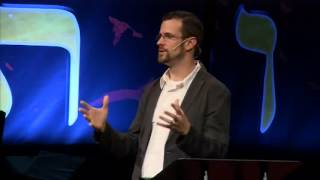
ALAN HORVATH
of AlanHorvath.com
The Book of Ruth
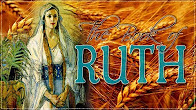
_______________________________________________________________________________________________________________________________________________
AUDIO TEACHINGS
EDDIE CHUMNEY
(Note: This is only accessible on the Internet Explorer browser)
The Themes of Shavuot
Shavuot: Yeshua, the Lawgiver
The Marriage of the Messiah to the House of Jacob
Shavuot: A Change of Heart
_______________________________________________________________________________________________________________________________________________
AUDIO BOOKS
HEBREW BOOK OF RUTH
For those who are interested, I have also included two different audios of the book of Ruth spoken in Hebrew below. Right click and choose "Save Target As" on each chapter.
Peter Schmueloff
Chapter 1 Chapter 2 Chapter 3 Chapter 4
Shlomo Bertonov
Chapter 1 Chapter 2 Chapter 3 Chapter 4
_______________________________________________________________________________________________________________________________________________
AUDIO MUSIC
STEVE McCONNELL
HAMOEDIM (1998)
Covenant Love
_______________________________________________________________________________________________________________________________________________
MOVIE
The Story of Ruth (1960)
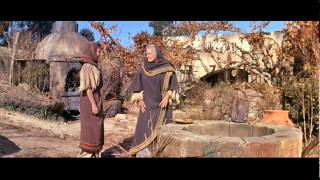
I pray that this was a blessing to you.
Any comments or questions you can contact me at
the.aleph-tav.project@msn.com
HAVE A BLESSED SHAVUOTH!
_______________________________________________________________________________________________________________________________________________
_______________________________________________________________________________________________________________________________________________
Copyright 2014 The Aleph-Tav Project - NVU's Website Design Software by The Premier Group